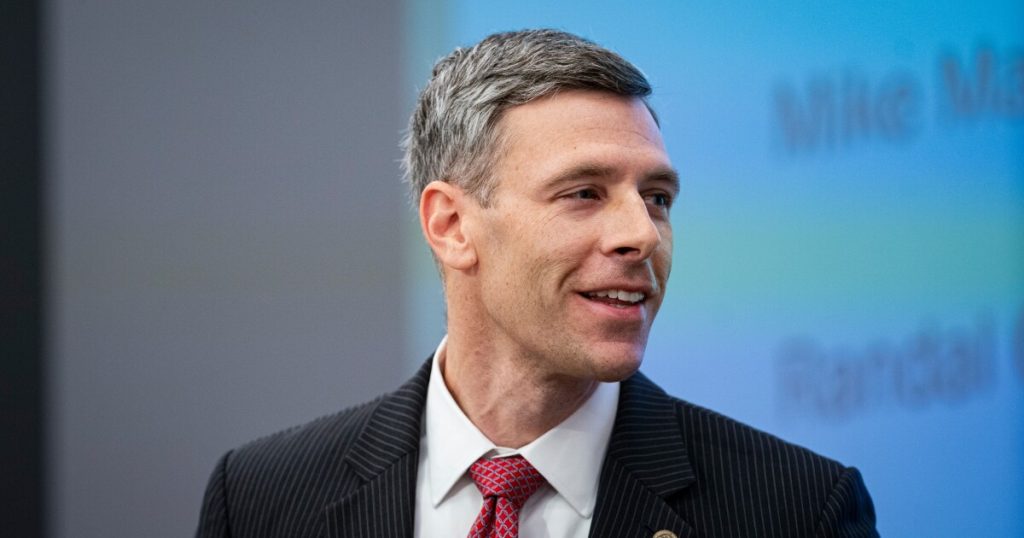- Key insight: Gould argued the OCC can only ensure fair oversight by admitting qualified fintechs and crypto firms through national trust charters, saying regulation outside the perimeter is impossible.
- Supporting data: He acknowledged concerns over fairness as the OCC reviews trust charters like Coinbase’s and said Dodd-Frank narrowed the “scope of banking relevance,” driving innovation outside the system.
- Forward look: Gould said the OCC will soon propose stablecoin issuer rules
under the GENIUS Act and warned that support for federal preemption — key to national bank powers — depends on sustaining political consensus.
NEW YORK — Comptroller of the Currency Jonathan Gould Tuesday defended bringing compliant fintechs into the regulated system, calling it “the only way” to begin to level the playing field between banks and challenger fintech firms.
In a fireside chat at The Clearing House’s annual conference moderated by Sullivan & Cromwell partner Rodge Cohen, Gould acknowledged that
“I have no ability to supervise or regulate nonbanks,” Gould said. “The only way I can possibly ensure a level playing field is for those who voluntarily come into the system. If they meet our statutory standards and our supervisory expectations, that’s literally the condition preceding before I can even attempt to put them on a level playing field.”
Gould argued that the OCC’s only mechanism to ensure consistent oversight is to admit qualifying firms into the chartered banking system under existing law.
“Our job is to look at the statutory factors as they exist — not as some might desire them to exist, or as one might hope Congress to provide clarity,” Gould said. “We have the statutory factors that we have, and it’s our job to apply those based on the facts presented to us in an application.”
Gould said regulations enacted by Congress and the banking agencies in response to the 2008 financial crisis in the Dodd Frank Act and subsequent regulations “narrowed the scope of banking relevance,” driving activity out of the system. Under his leadership, Gould expressed the need to consider how qualified fintechs could help expand the industry’s reach while subjecting them to full oversight. Fintechs applying for the national trust charter are regulated differently than banks, and critics of allowing fintechs to gain national trust charters have
“If there are new entrants that meet the statutory factors as they currently exist, and can meet our supervisory expectations … and they want to voluntarily come into the system where they can actually be held to the same standard, and where we can, through our regulation and supervision, make them better over time, I think that’s a positive thing that people should welcome,” Gould said.
The discussion later turned to federal preemption, which Gould characterized as not just a legal but political question. He cited waning support from state regulators for federal preemption and warned that the legal foundation for preemption depends on sustained political consensus.
“My view is that the legal parameters around preemption … are all downstream from the political support that is necessary to support it,” Gould said. “If the political consensus that is necessary to support preemption erodes over time, the legal parameters are going to narrow.”
The National Bank Act — which established the national banking system and its regulator the OCC — provides the legal foundation for preemption in the national banking system, allowing federal law to override certain state regulations that interfere with the powers of nationally chartered banks. Preemption is a legal concept grounded in the Supremacy Clause of the U.S. Constitution, which establishes that federal laws override conflicting state laws.
Gould laid out a strategy to “defend preemption” through a multifaceted strategy that extends beyond legal briefs and intervention by the agency in court cases.
“It’s not enough just to engage on the legal merits,” he said. “That is downstream from the eroding political support that we’ve seen over the last 15 years for preemption.”
State regulatory advocates have
Gould said he supported preemption as a “defining characteristic” of the banking system that benefits both nationally chartered banks and state-chartered banks alike. The Riegle-Neal Act of 1994 and its 1997 amendments barring the exportation of interest rates, he said, do more than many appreciate to keep the banking system safe and fair.
“That’s one of the things I feel strongly about, ensuring that state banks also enjoy the benefits of federal preemption that Congress has given them,” Gould said. “Congress has given them [protections], including in the 1997 Riegle-Neal amendments on interest rate exportation, which I think has not always been as robustly advertised and defended as it should be.”
Gould also previewed forthcoming OCC rulemaking under the
“We expect to issue a proposal … setting forward liquidity and other restrictions or requirements around stablecoin issuers,” he said, calling for industry feedback on how regulators “might mitigate or monitor for any kind of serious impact to deposits.”
He also downplayed fears of rapid adoption of stablecoins draining deposits out of the banking system, a concern that the banking industry and some independent experts have raised. Gould predicted any deposit migration would unfold gradually and with ample warning for banks and regulators to react in time.
“If there were to be a material impact on deposits because of stablecoins, my belief is that it would not happen overnight — it would happen over weeks, months, years,” Gould said. “We have certain ability to mitigate some of the downside risks that some have articulated might occur as a result of widespread stablecoin adoption.”

